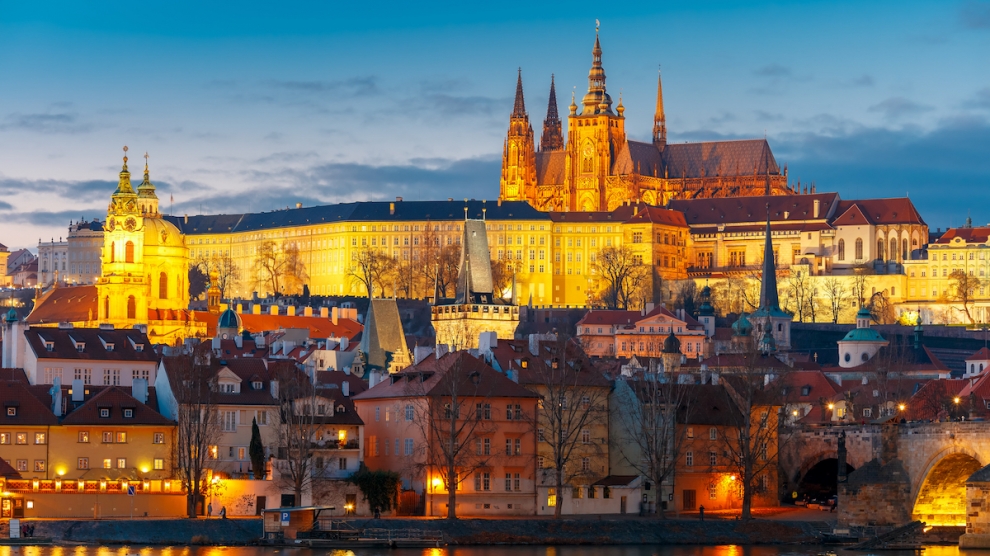Our weekly digest of articles about emerging Europe published elsewhere this week, all of which caught our eye and all of which are well worth your time. Listing them here, however, does not necessarily mean that we agree with every word, nor do they necessarily reflect Emerging Europe’s editorial policy.
—
Richard Fidler and the magical lure of Prague
Richard Fidler’s new book The Golden Maze is a biography of Prague, which features all the significant characters and events from Czech history – reformers, recalcitrants, artists and revolutionaries. Figures including kings Wenceslas and Charles IV, theologian Jan Hus, the German astronomer Johannes Kepler, Emperor Rudolf II, Empress Maria Theresa, composer Bedrich Smetana, tragic activist Jan Palach, and politicians Tomas Masaryk, Jan Masaryk, Dubcek and, of course, Vaclav Havel.
—
Front line communities and Ukraine’s local elections
On October 25, Ukraine will hold the country’s first nationwide local elections since completion of the initial phase of far-reaching decentralisation reforms launched in April 2014. This gives the vote added significance as an important step forward for representative democracy in Ukraine and the adoption of European standards in self-governance.
—
Two countries, two murders that deserve answers
Maltese MEP David Casa testified before the public inquiry into journalist Daphne Caruana Galizia’s assassination in late July saying Dubai had offered assistance in the investigation on 17 Black, casting doubt on what the former Head of the Economic Crimes Unit Ian Abdilla had told the court. A month earlier, 300 Latvian police officers raided ABLV Bank in Latvia to investigate a payment made by ABLV to 17 Black of 1.4 million US dollars with a possible link to Azerbaijan. That must mean Latvia is also giving full assistance. Or is it?
—
Norman Davies: The Battle of Warsaw, one hundred years on
The Cud nad Wisłą, or Miracle on the Vistula, was no miracle. It was a hard-fought battle, which took place in August 1920 near Warsaw and ended in a decisive Polish victory over the Red Army of Soviet Russia. It was won by the skill, discipline and determination of the Polish defenders; by the patriotic spirit of a large numbers of volunteers; and by Marshal Józef Piłsudski’s brilliant counterattack, which stopped the Soviet offensive in its tracks. Only afterwards were theories put forward by Piłsudski’s nationalist opponents suggesting that victory should be ascribed either to General Maxime Weygand or to Providence. The height of the battle happened to coincide with the Feast of the Assumption, when many Polish Catholics prayed for their country’s salvation. So, people naturally felt their prayers had been answered.
—
‘Albanian PM’ demand may be slowing North Macedonia coalition talks
The former partners in the last coalition government in North Macedonia, the Social Democrats, SDSM, of Zoran Zaev, and the Democratic Union for Integration, DUI, led by Ali Ahmeti, are engaged in substantial talks on a new government, amid speculation that talks might be stuck over the DUI’s insistence on an ethnic Albanian prime minister.
—
Arrested in Belarus: A teenager’s experience
In Belarus tens of thousands have taken to the streets of Minsk and other cities since Sunday protesting at what they say were rigged elections in favour of the incumbent Alexander Lukashenko. One of those arrested was 16-year-old Miron. His parents were also detained when they went to a police station to find him.
Listen to the full report here.
—
Investors in Belarus face ‘dictator dilemma’, Putin may hold the key
Investors face a classic ‘dictator dilemma’ in Belarus – hold on to securities that benefit from the status quo in a brutal regime, or sell them and sever their ties – but which way they go may depend largely on Vladimir Putin’s Russia.
—
Carbon critical: Last train from Bełchatów?
The key to energy transition is energy replacement—quitting coal. That’s proving difficult for Poland, for whom EU climate policy is trending in the wrong direction.
—
Azerbaijan, Armenia clashes may continue until territorial conflict is resolved
As tensions rose between Azerbaijan and Armenia amid clashes at the border and military preparations, a Turkish scholar has said there is a likelihood for clashes to occur until the territorial conflict between the two countries is resolved. “Armenia and Azerbaijan are ready to clash with one another at every chance possible,” said Professor Mitat Çelikpala from Kadir Has University, specialised in Eurasian security and politics, in an online interview with Hürriyet Daily News.
—
12 years on from Russia’s military aggression against Georgia
Twelve years have passed since the Russo-Georgian war of August 2008. That is more than enough time to assess its major consequences not only for Georgia but also on a broader scale.
—
We run this: Smashing misogyny in Romanian hip-hop
The Romanian music industry is riddled with misogyny. Especially when you step underground. The sexist comments which Romanian female rappers receive online are both predictable and overwhelming. But it hasn’t always been this way.
—
Unlike many news and information platforms, Emerging Europe is free to read, and always will be. There is no paywall here. We are independent, not affiliated with nor representing any political party or business organisation. We want the very best for emerging Europe, nothing more, nothing less. Your support will help us continue to spread the word about this amazing region.
You can contribute here. Thank you.







Add Comment